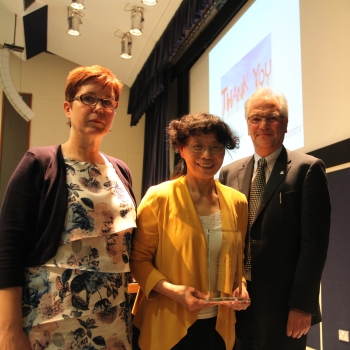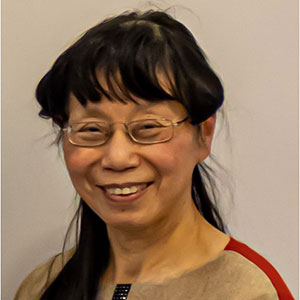Biography
Ying completed her PhD at Manchester University in Materials Science and Technology in 1994. Before that, she obtained a BSc in Chemistry Engineering and a MSc in Polymer Science and Technology in Hunan University in 1981 and 1987 respectively. Between 1995 and 1997, she took up a postdoctoral research fellow in Tokyo Institute of Technology working on engineering polymer blends aiming to develop new automobile industrial materials. In the late 1997, Ying took a research associate position in Keele University and started her materials research in the medical field. Ying was appointed as a lecturer in Biomaterials and Tissue engineering in 2001 and promoted to senior lecturer in 2006 and reader in 2009. In December 2015, Ying was appointed as a chair and professor in Biomaterials and Tissue engineering.

Inaugural Lecture 3 July 2017 available on YouTube: https://www.youtube.com/watch?v=7LjN-hLJyZI&feature=youtu.be
Research and scholarship
Group Lead for Materials for Bioscience research group
and active member of Regenerative Medicine FReT & Orthopaedics & Biomechanics research group
Ying's current research has been focused on the application of engineering strategies in translational medicine. Great effort has been made to establish systematic study methods in utilizing smart/unique materials that trigger and detect specific cellular responses and application of non-destructive monitoring modalities for complicate cellular systems. The research includes smart nanofiber design and applications, detection of variation of cell adhesion capacities, developing immunemodulating materials, exploring unique techniques to detect heterogeneous cellular populations and correlating the structures of collagen based matrices to diseases. A few clinical relevant projects are being undertaken in relation to different tissues and organs, from colony growth of stem cells for cell therapy, rapid bone formation, osteogenic potency assay, pathological calcification of heart valves, the relation of pelvic organ prolapse and ageing. Ying's regeneration medicine research is centralized on bone, cartilage, blood vessel, cornea, retina, pseudoislets, skin, nerve generation and characterization.
THE ON-GOING PROJECTS INCLUDING:
• Establishment of 3D ARVC model from iPSC-CM cells
• Development/translation of xeno-free, nanofiber-based scaffold/actuator for human pluripotent stem cell expansion, differentiation, and implantation
• Replication and investigation of limbal stem cell niches
• Correlating the degradation in biomaterials and the associated immune response in macrophages by multimodal non-invasive imaging techniques
• Fabricating and characterization of fully functional blood vessel for homeostatic and vascular disease study
• Development of smart surface modification techniques with anti-biofilm, anti-fouling functions
• Separation and characterization of the progenitor cells in cardiac cell mixture
• Exploring novel nanofabrication protocols as matrix for iPSC-CM maturation
• Development of better pseudoislet model for diabetes treatment
• Investigation of relation of ageing and connective tissue disorder including prolapse, preterm premature rupture of membranes
• Development implantable 3D neuron circuits for treatment of disorder in CNS
• Application of FTIR techniques as diagnostic and characterization tool for disease and regenerative tissues
• Establishment of novel non-destructive optical modalities (OCT, Raman spectroscopy, microindentation) for tissue regeneration applications
Teaching
MSc courses in
- Cell & Tissue Engineering
- Biomedical Engineering
MTE-40036 Biomaterials, module leader
MTE-40024 Human Anatomy and Physiology, module leader
MTE-40033 Cell and Tissue Engineering, contributor
MTE-40034 Cell Biomechanics, contributor
MTE-40022 Bioreactor and Growth Environment, contributor
MTE-30002 Introduction of Biomedical Engineering, module leader
Coordinator: 3+1+1 programme with Guangzhou University
Supervising final year student projects in Life Science, Medicine and MSc projects
Further information
University Duties
- Programme director of master course, Biomedical Engineering, 2008-2014, 2019 to present
- Member of faculty postgraduate committee, 2019- present
- Deputy lead of Faculty Regenerative Medicine theme
- Group lead of Materials for Biomedicine in PhaB
- Chair of Postgraduate Medical School Safety Committee 2006-2015
- Departmental COSHH Officer in Postgraduate Medical School 2004 - 2017
- Departmental Laser Safety Adviser in Postgraduate Medical School 2004 - present
- Departmental Radiation Safety Adviser in Postgraduate Medical School 2004 - present
Membership of Professional Associations
- Member of European Biomaterials Society
- Member of European TERMIS
- 2003-2006 Member of IPEM (SIG)
- 2005-present member of SPIE
- 2006-present EPSRC College membership
Publications
BOOKS
- Li J, Yang Y, Gu K, Dong G. (Eds.). 2004. Biological micro- and nanotribology – Nature’s solutions. China Machine Press, Beijing, China.
- Yang Y, Yuan CQ, Li J, Gu KL, Hu B. (Eds.) (2008) Nanoscale technology in biological systems, (edited and translated from English to Chinese, original authors: Greco RS, Prinz FB, Smith RL), pp. 1-485, China Machine Press, Beijing.
Funding
- 2016 £6000, The British Council Newton Fund: PhD Placement grant (PI)
- 2015 £55,000, EPSRC CDT PhD studentship (PI), ‘Tissue engineering retinal and glaucoma eye models for better clinical treatment’
- 2015 £30,000, EPSRC, min-project (PI), Diagnostic tool to identify donor dependent heterogeneity population
- 2015 £29,000 , Acorn fund (Co-I), ‘A tissue engineering approach to improve lung function and clinical outcome in patients with emphysema’
- 2015 £195,000, MRC (Co-I), ‘Hub of engineering and exploiting the stem cell niche’
- 2015 £12,000 Chinese Studentship Council (PI), One year joint PhD studentship, ‘Novel peptides and surface modification strategies for anti-microbial devices’
- 2014 €181,000 EC Maria Curie incoming fellowship (PI), ‘Smart scaffolds for bone regeneration’
- 2014 £12,000 UHNS fund (PI), ‘Prolapse mechanism study with ethical approval for 100 patient samples’
- 2014 £81,000 PhD studentship (PI), Jordan local organization, ‘New strategies for cartilage regeneration’
- 2014 £100,000 PhD studentship (PI), Iraqi Government, ‘Pseudoislet formation on diabetes study’
- 2014 £72,000 PhD studentship (PI), Rivers state sustainable development agency, Nigeria, ‘Prolapse and ageing study’
- 2014 £100,000 Medical Institute of North Staffordshire (PI), ‘Better glaucoma treatment’
- 2013 ¥880,000 Chinese NSFC (Co-I), ‘New bioorganic-metal for ship antifouling and drag reduction’
- 2013 £100,000 EPSRC manufacture centre (Co-I), ‘Challenge-Led Regenerative Medicine Manufacturing Research’
- 2012 £104,000 BHF PhD Studentship (PI), ‘Development of a human 3D tissue-engineered blood vessel model for the study of haemostasis’
- 2012 £20,000 NHS Charitable fund (PI), ‘Development of a rapid bone formation technique for clinical applications’
- 2012 £371,000 EU FP7 project (Co-I), ‘Biodesign’
- 2012 £11,400 Royal society of International exchange (PI), ‘Control and mapping of mechanical signals in pre-vascularized engineered bone’
- 2012 £25,000 Acorn fund (PI), PhD studentship, ‘Acceleration of bone formation’
- 2011 2 month high magnetic field time and secondment funding, EuroMagNET II (PI), ‘Generation of orthogonal aligned fibers in hybrid hydrogels for corneal regeneration’
- 2011 £68,000 EPSRC DTC PhD studentship (Co-I), ‘Generating 3D neuronal networks in vitro – towards therapies for Huntington’s disease’
- 2010 £68,000 EPSRC DTC PhD studentship (Co-I), ‘Development new nanotechnology for spinal cord repair’
- 2010 £21,000 Acorn fund (PI), PhD studentship, ‘Study of calcification mechanism in heart valve’
- 2009 £68,000 EPSRC DTC PhD studentship (PI), ‘Development new corneal model for drug screening’
- 2009 € 90,000 EU, 7th Framework, Marie Curie Action (PI), ‘Development of new strategies for osteochondral regeneration
- 2008 £9,000 BBSRC pathfinder (PI), ‘Development and commercialization of a surgical phantom system for the brain research, therapy and education’
- 2008 £10,000 The Innovation Keele (PI), one postdoctoral, ‘Development of phantom kit for mammal brain therapeutic surgery’
- 2007 £413,000 BBSRC (PI), one postdoctoral, ‘Novel in vitro corneal model with on-line mechanical characterisation for pharmaceutical screening and tissue engineering’
- 2007 £22,000 Acorn fund (Co-I), PhD student, ‘Study of cancer cell sensitivity to chemotherapy and tumour cell invasion’
- 2007 £525,000 BBSRC (Co-I), two postdoctorals, ‘In vitro (pre)construction of neural circuits in transplantable, biodegradable scaffolds for CNS repair in vivo’
- 2006 £54,000 BBSRC CASE studentship (PI), ‘Development of degradable nanofiber scaffolds for regenerative medicine’
- 2006 £20,000 Institute of orthopaedics, Oswestry (Co-I), ‘Development of nanofiber based constructs for regenerative medicine’
- 2005 £280,000 EU network, EXPERTISSUE (Co-PI), ‘Novel therapeutic strategies for tissue engineering of bone and cartilage using second generation biomimetic scaffolds’
- 2005 £60,000 Marie Curie scholarship (PI), PhD studentship, ‘Novel sensing scaffolds for tissue engineering’
- 2004 £171,000 BBSRC (Co-I), one postdoctoral, ‘Quantitative on-line assessment of collagen fibre organization in connective tissue in vivo and during conditioning in vitro’
- 2003 £207,000 EPSRC (PI), one postdoctoral and one PhD studentship, ‘Development of mechano-active scaffolds for tissue engineering’
School address:
School of Pharmacy and Bioengineering
Hornbeam Building
Keele University
Staffordshire
ST5 5BG
Research centre address:
School of Pharmacy and Bioengineering
Guy Hilton Research Centre
Thornburrow Drive
Stoke-on-Trent
ST4 7QB
Tel: +44 (0) 1782 674988
Undergraduate enquiries:
Email: enquiries@keele.ac.uk
Tel: +44 (0)1782 734010
Postgraduate enquiries:
Please contact the CPD4ALL team:
Email: phab.postgraduate@keele.ac.uk
Keele Centre for Medicines Optimisation (KCMO)
Tel: +44 (0)1782 733831 / 734131
The Virtual Patient project enquiries:
Contact our Digital Development team:
Email: pharmacy.digital@keele.ac.uk


